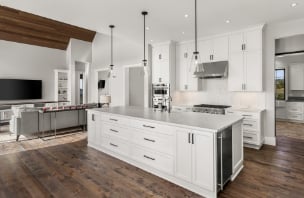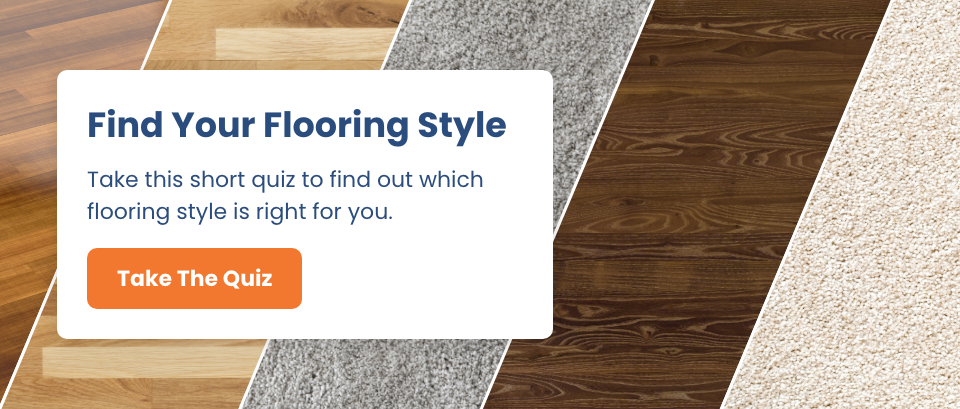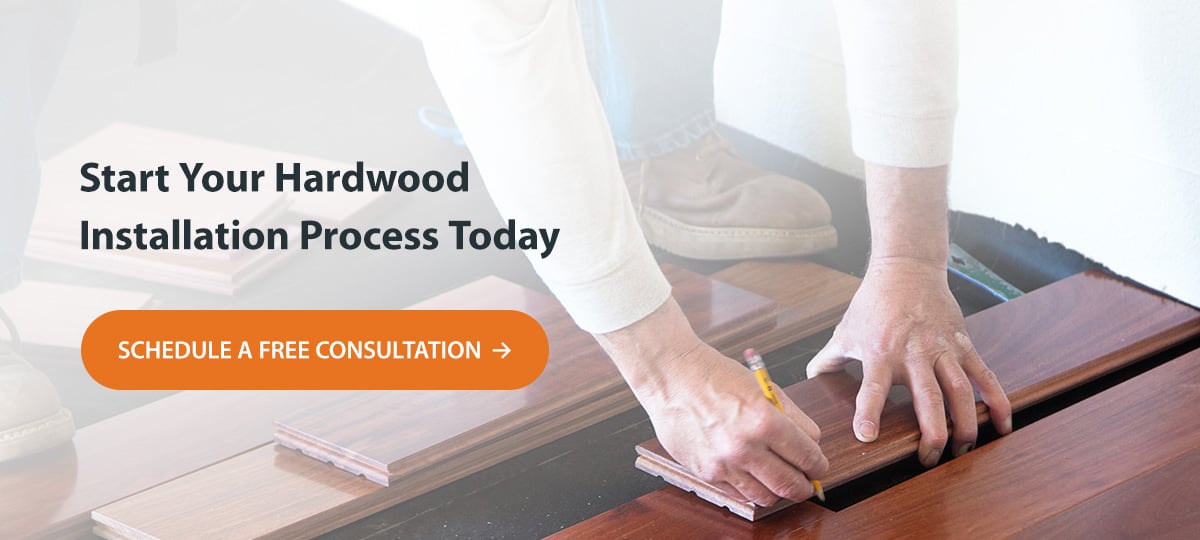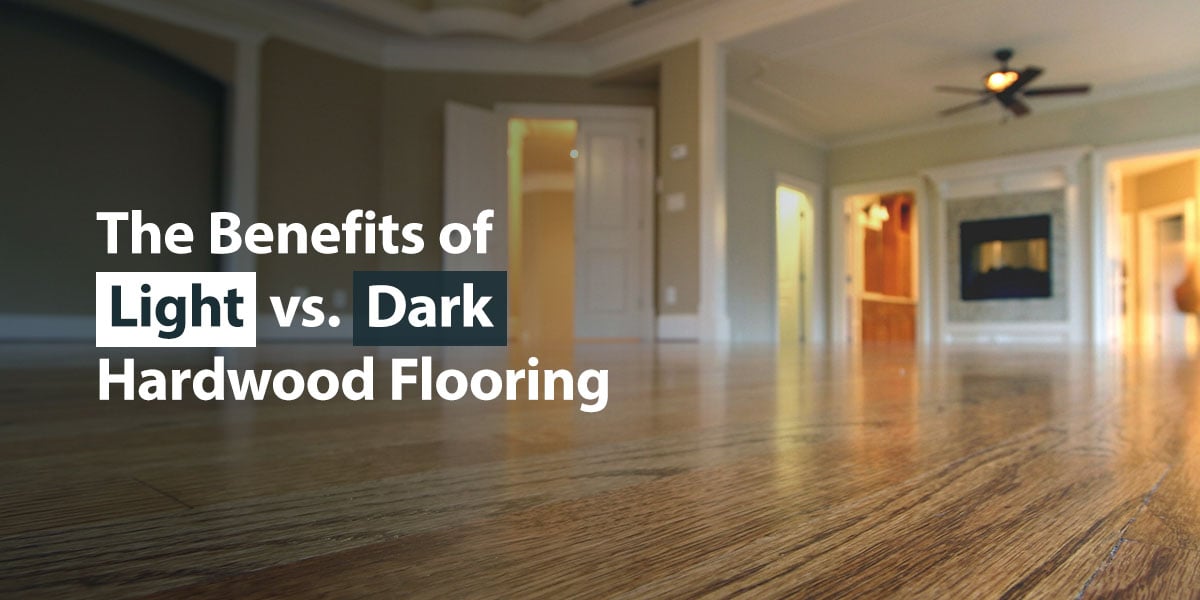

Once you’ve settled on incorporating hardwood flooring into your home, you’ll face another decision: choosing between light and dark hardwood floors. The differences between various hardwood flooring colors can seem subtle, but a slightly lighter or darker wood can make a big impact on your entire home decor.
While dark wood floors are great for creating a sleek, classic look, light wood floors fit more modern styles and can hide scratches better. There are benefits to both light and dark styles, so you will need to decide which is the best fit for your home. Let’s take a closer look at dark and light hardwood advantages.
View Engineered Hardwood Flooring
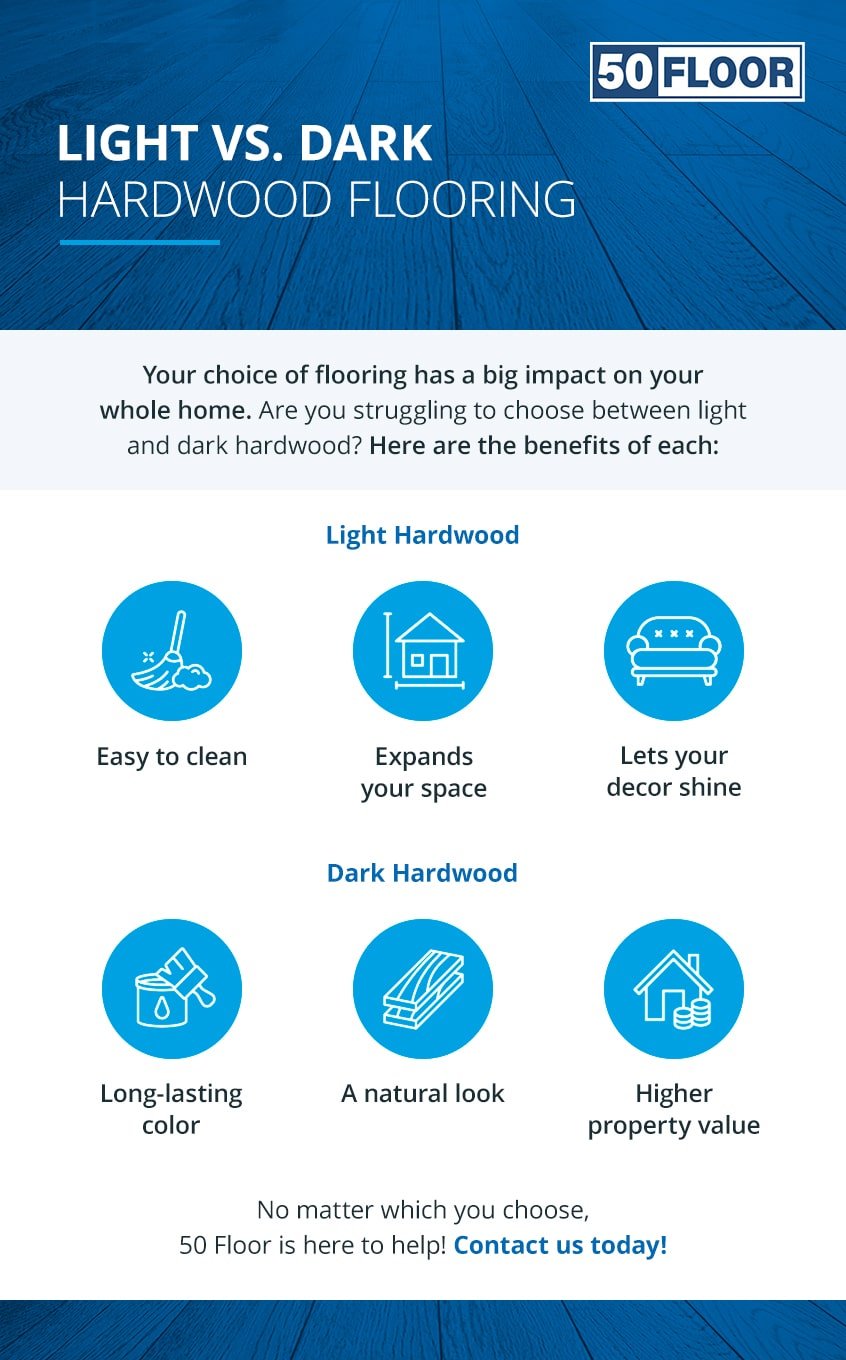

Light Hardwood Floors
Light hardwood flooring is wildly popular for its bright, natural, and modern look. When done well, a light hardwood floor can open up a room and create a more spacious feel, enhancing the natural light. Other light hardwood benefits include:
- Easy to clean: Light hardwood hides dirt and scuffs better, making it easier to maintain. That means less need to break out the broom or shake your head over marks and scrapes.
- Expands your space: Lighter wood has a way of making a space feel bigger and airier by accenting natural light. This optical trick makes it a good choice for houses with limited square footage.
- Lets your decor shine: Light hardwood is subtle. If you want a classic, polished floor that will allow your signature furniture pieces, lavish decorative style or fun patterned wallpaper to shine, lighter floors may be the better flooring pick for you.
Flooring and Carpet Installation
Dark Hardwood Floors
Dark hardwood is very popular. It has a rustic, polished feel that can increase your home value. Dark hardwood benefits include:
- Long-lasting color: Dark hardwood absorbs sunlight rather than reflecting it. Over time, you’ll find that your dark flooring results in less sun damage, retaining its dark sheen for longer.
- A natural look: If you want to enjoy the natural look of wood grain, dark hardwood may be right for you.
- Higher property value: Both dark and light hardwood floors can boost the market value of your home. However, a darker grain typically yields a higher value. As the current most popular hardwood style, dark flooring could pay off if you decide to sell your house in the near future.
Factors to Consider When Choosing Light or Dark Wood Floors
When comparing dark vs. light hardwood floors, you’ll want to consider:
- The color of your cabinets: Rather than matching your cabinets exactly, choose a different yet complementary flooring color. If you have light wood cabinets, for example, a dark hardwood floor will add some depth and dimension to the room. Juxtaposing dark wood with light wood can add instant visual interest to any room.
- Who will use your floor: Do you have pets or young children? If so, they are likely to track in a considerable amount of mess. Dust and pet hair show more on darker floors, so you can expect to need to clean darker wood floors more frequently than lighter wood. Light hardwood also conceals scrapes and scratches better than dark hardwood.
- The current style of your home: Does your house and decor style lean toward classic tastes? Or have you created a modern, minimalist look? While you’re free to mix and match styles, many homeowners find that lighter wood is ideal for creating a more contemporary style, while darker hardwood flooring is used for a more rustic or classic design.
- The wood finish you prefer: The type of finish you choose can slightly alter the appearance of the wood. Some finishes look better on different types and colors of wood than others. Matte or satin finishes tend to look better on darker wood, while glossier finishes pair well with lighter wood.
- The size of the room: Of course, dark or light wood can work in any room. However, if you’re looking to make a smaller room feel bigger, you’ll want to opt for a lighter flooring choice. Lighter colors help brighten up a room, making it feel bigger.
- The amount of natural light in the room: If you love natural light and your home gets plenty of it, you may want to opt for a darker wood floor as it tends to fade less quickly than lighter flooring options. On the other hand, if your home does not receive much natural light, having dark flooring can make your home feel even darker. For dimly lit homes, lighter-colored wood flooring can, quite literally, brighten up the space.
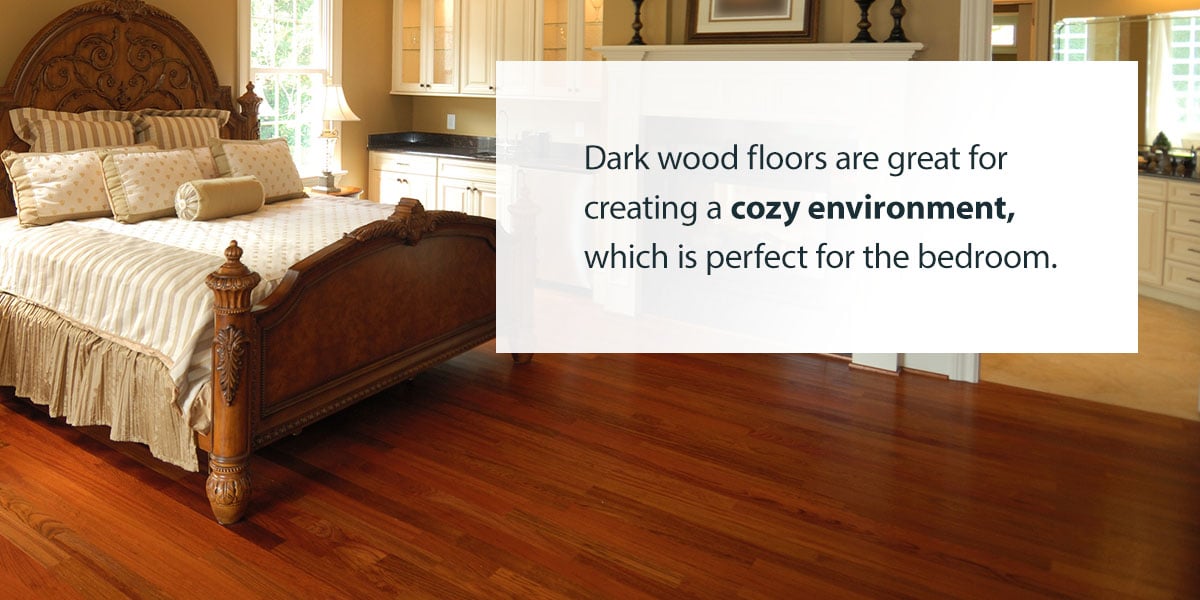

Light vs Dark Hardwood Flooring by Room
Your flooring needs are likely to vary by room. When choosing between dark and light wood flooring, consider the functionality of the room and your design plan. While considering light or dark floors, remember the following:
- Bathrooms: Bathrooms tend to be one of the smaller rooms in a home, and light wood is known for making rooms feel bigger. If you’re looking to make your bathrooms feel more spacious, you may want to lean more toward light-colored hardwood flooring. Dust is also more unnoticeable with light-colored floors. However, remember that hardwood flooring may be a bit more challenging to maintain in a wet environment like the bathroom.
- Bedroom: Dark wood floors are great for creating a cozy environment, which is perfect for the bedroom. Since you likely won’t be eating in your bedroom or tracking in dirt, you don’t have to be as concerned about cleaning as much. And because your bedroom is an easier place to maintain, you can enjoy the look of dark hardwood with fewer cleaning requirements.
- Kitchen: Messes are bound to happen in the kitchen — from spills while cooking to crumbs from a late-night snack. Light wood flooring is better at hiding dust, dirt, and small debris, making it a suitable and popular option for kitchens.
- Living areas: You spend a lot of time in your living room or den, so you want to love the look of your flooring and overall design. Both light and dark flooring can work in living areas, so choose the color that works best with your design style. However, if you have a lot of natural light in these areas, keep in mind that light wood flooring fades faster than dark wood.
Common Questions About Light and Dark Wood Floors
Still not sure if light or dark wood floors are right for you? We’ve gathered some popular questions about dark and light flooring to help you weigh your options.
1. Are Dark Floors in Style?
Dark hardwood floors are a beautiful, classic floor option that will never go out of style. This flooring style brings sleek elegance and a bit of dramatic flair to a home. However, while dark floors remain in style, they do not always work with every design style, such as modern or contemporary.
2. Are Light Hardwood Floors Out of Style?
Light hardwood floors are not out of style, and we don’t see that happening any time soon. However, some shades of light hardwood flooring are more popular than others. Light gray and white oak are two currently trending light hardwood floor colors.
3. Do Dark or Light Floors Make a Room Look Bigger?
Light floors are known to brighten up a room, making the room feel bigger.
4. Do Dark Floors Make a Room Look Darker?
Yes, dark floors can make a room look darker if there is not a lot of natural lighting. However, if you have a big, open room with a decent amount of natural lighting, your room will still feel spacious with dark flooring.
5. Are Light or Dark Floors Better for Resale?
Typically, dark hardwood floors increase the value of a home for sale more than light hardwood floors.
Start Your Hardwood Installation Process Today
Whether you decide that light or dark wood floors is the right choice, 50Floor is here to help. We can install your new flooring and ensure your floor is prepared and stained impeccably. Schedule an appointment for a free in-home assessment — we’ll come right to you!
Frequently Asked Questions
How to Choose the Right Stain Color for Dark Hardwood Floors?
Choosing the perfect stain color for your dark hardwood floors involves understanding the impact of various shades on your living space. Here’s a step-by-step guide to help you make the best decision:
Understand the Mood and Style You Want to Convey
Consider the atmosphere you wish to create in your home. Different stain colors can evoke various moods:
- Espresso: Offers a timeless, classic appeal.
- Mahogany: Adds a touch of luxurious warmth.
- Gray: Provides a modern, contemporary vibe.
- Black: Makes a bold, daring statement.
View Flooring Samples in Natural Light
It’s crucial to see how different stains look under your home’s natural lighting. Bring home samples and place them in different areas to observe how the color varies with changing light conditions throughout the day.
Get Inspiration from Design Resources
Look at interior design magazines, websites like Houzz or Pinterest, and home décor shows for ideas. Pay attention to how certain stains complement various furniture styles and room aesthetics.
Consult a Professional
If you’re uncertain, seek advice from flooring experts or interior designers. Their experience can offer valuable insights into which stain colors work best with your existing décor and lifestyle needs.
Order Samples or Test on a Small Area
Many companies allow you to order sample swatches. Alternatively, test stains on an inconspicuous area of your floor to see how they interact with your wood type and room environment.
Consider Maintenance and Longevity
Darker stains can show scratches and dust more easily than lighter shades. Take into account the maintenance required to keep your floors looking pristine.
Final Thoughts
Selecting the right stain color is both a practical and aesthetic choice. By balancing your personal style with practical considerations, you’ll achieve a stunning, customized look that enhances your home’s beauty.
Remember, the key factors are understanding different moods, viewing samples in natural light, and considering long-term maintenance. This approach will ensure an informed decision for your beautiful dark hardwood floors.
Maintenance Tips for Dark Hardwood Floors
Maintaining dark hardwood floors not only keeps them looking beautiful but also extends their lifespan. Here are some essential tips to ensure your floors remain a stunning feature in your home:
- Regular Cleaning: To prevent dirt and debris from scratching the surface, make it a habit to sweep or vacuum your floors frequently. A soft-bristle broom or a vacuum with a floor-brush attachment works best.
- Mopping Tips: Occasionally mop your floors using a specialized hardwood floor cleaner. Avoid using excessive water, as it can seep into the wood and cause damage. Instead, a damp mop with a quality cleaner will do the trick.
- Furniture Protection: Place felt pads under the legs of furniture. This simple step can prevent unsightly scratches and dents when you move chairs or tables.
- Spill Management: Promptly wipe up any spills to prevent water damage and staining. Use a soft, dry cloth to blot spills, rather than wiping, to avoid spreading liquid across the floor.
- Avoid Shoes Indoors: Encourage family members and guests to remove their shoes before walking on hardwood floors to minimize scuffing and dirt transfer. High heels can be particularly damaging, so consider placing a shoe rack near entrances.
By following these maintenance tips, your dark hardwood floors will continue to be a beautiful and timeless aspect of your home.
How Can Dark Hardwood Floors Be Practical in the Kitchen?
Dark hardwood floors in the kitchen are an unexpectedly practical choice, combining both aesthetics and functionality. Here’s why:
Durability and Maintenance
Dark hardwood floors are renowned for their durability. Unlike lighter floors that may show wear and tear more easily, dark wood can withstand the high traffic typical of a busy kitchen. They also tend to hide stains better, although regular cleaning is still recommended.
Versatile Design Options
Whether you opt for traditional hardwood or the more contemporary engineered wood, dark floors offer a versatile base for numerous design styles. You can transition seamlessly from the kitchen to adjoining living spaces, maintaining a cohesive look throughout your home.
Color Coordination and Aesthetic
One of the standout features of dark hardwood floors is their ability to enhance the overall aesthetic of your kitchen. Pairing them with light or white cabinets creates a stunning contrast, adding depth to the space. Sleek countertops can further elevate this look, achieving a balanced blend of warmth and modernity.
Key Benefits:
- Durability: Long-lasting and resistant to high traffic.
- Low Maintenance: Efficient in hiding minor dirt and wear.
- Design Flexibility: Complements both traditional and modern styles.
- Visual Appeal: Enhances kitchen beauty with striking color contrast.
By choosing dark hardwood floors for your kitchen, you’re not just opting for style but also functionality and ease of maintenance, ensuring your kitchen remains a vibrant, welcoming space for years to come.



